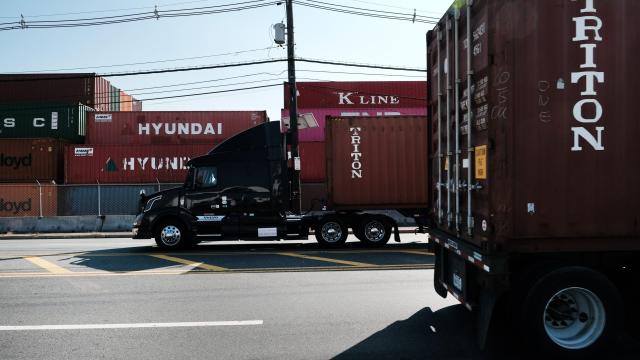A trucker of 20 years is echoing what some have been saying about the the supply chain hiccups threatening to ruin the holidays. There aren’t enough drivers for huge volume loads in part because drivers aren’t getting paid enough for their work. And there aren’t enough chassis for those who are showing up.
Ports across the country are working to clear piles of containers in hopes of easing product shortages for the upcoming shopping season. Conditions there have become such a mess that containers are being left in residential areas, while Los Angeles and Long Beach plan to impose fines on companies allowing containers to sit around. Veteran trucker Ryan Johnson posted an essay to Medium offering another reason why things may not get better anytime soon: drivers aren’t paid enough for the working conditions.
Johnson describes ports as having three lines, one to get in, one to get your container and another to get out. Each line normally takes an hour to get through, but delays are frequent, leading to horrendous wait times adding up to entire workdays. It’s a story echoed by Business Insider.
As noted in that Business Insider report, about 20 per cent of port truck drivers get paid by the hour. Most are independent contractors paid by the load. You can see where this is going. Drivers aren’t paid for the time sitting and waiting. And since they are contractors, they are mostly on the hook for expenses related to the truck. In some cases, the situation has gotten so bad that drivers are losing money for showing up to work.
This is in-line with a Quartz report that notes a problem in the trucking industry is retention:
Many of those licensed drivers are no longer behind the wheel because they can find better working conditions and pay elsewhere. Jobs in factories, construction sites, and warehouses pay similar wages, and don’t require people to work 70-hour weeks, sleep in parking lots, or wait in line for hours without pay or bathroom breaks to pick up a container at an overwhelmed port.
Trucking companies are responding to this by raising wages, but according to the Teamsters Union, the slight increases won’t be enough. Trucker News spoke to other truckers and notes not getting paid a fair wage was a common complaint, along with working conditions.
This really goes to say that what Johnson is saying is a sad reality, and he drives it home hard with one line:
How do you convince truckers to work when their pay isn’t guaranteed, even to the point where they lose money?
But of course, pay isn’t the only factor. Truckers that are showing up to get containers out of the port are finding not enough chassis to slap those containers onto, further adding to the mounting delays. Warehouses are facing a similar labour problem where again, there are enough workers out there, but they’re taking other jobs.
The solution to Johnson and others is clear: if these supply chain bottlenecks are to end, companies should stop being greedy and not only pay drivers more, but supply them with the chassis to do their jobs.
